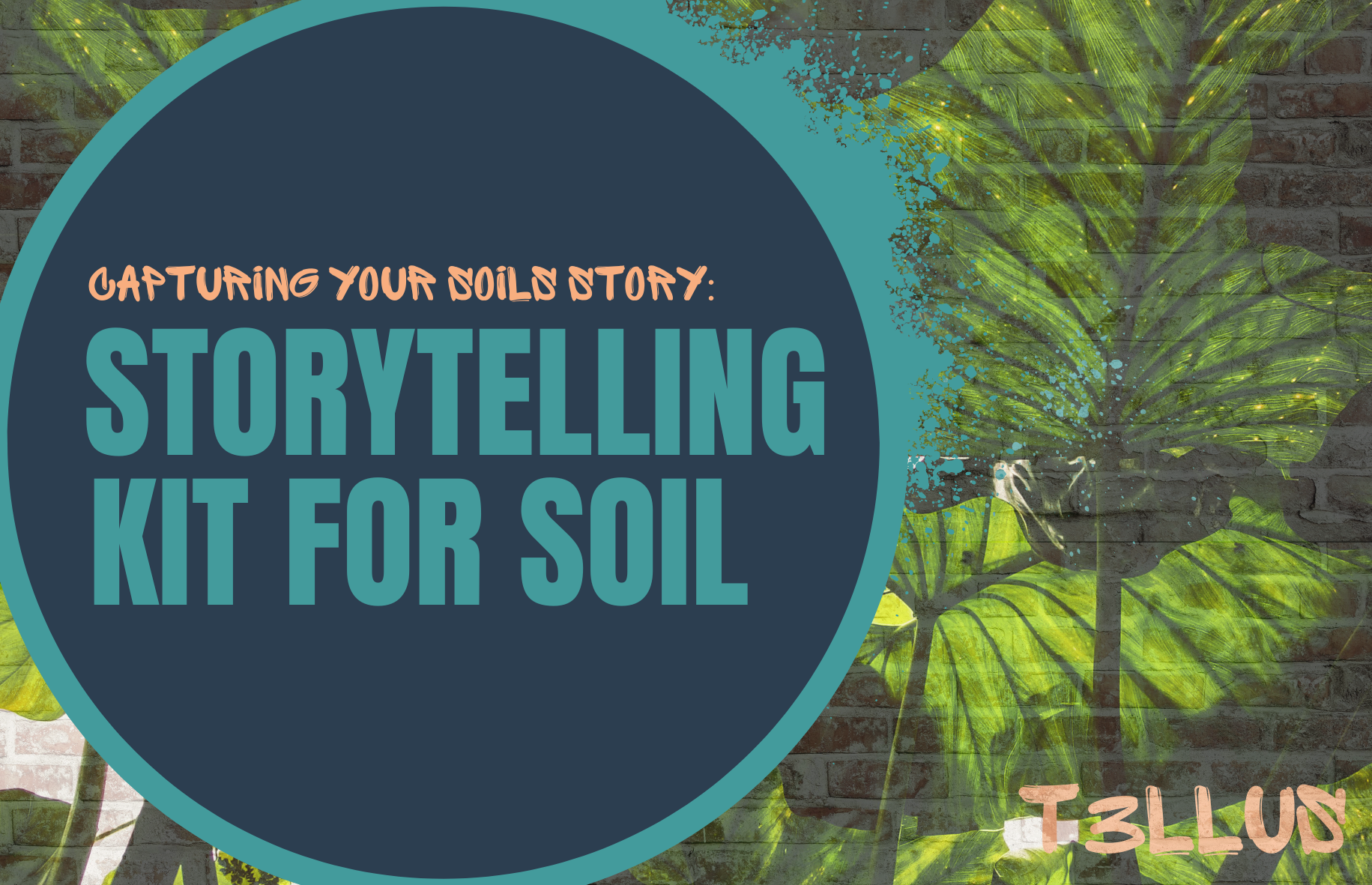Capturing Your Soil's Story: Storytelling Kit for Soil
Unlock the hidden secrets of your garden with our Storytelling Kit for Soil. At T3llus, we believe your soil holds a unique narrative, a tale of connection, growth, and sustainable impact waiting to be discovered. This kit isn't just about soil testing—it's about uncovering the rich, vibrant stories your soil has to tell.
Why Choose the Storytelling Kit for Soil?
Deep Connection: Understand the intricate relationship between your plants and the soil. Our kit provides insights that help you foster a deeper connection with your garden.
Growth and Potential: Learn about your soil's specific needs and potential. Our kit guides you in nurturing a thriving, vibrant ecosystem that reflects your values and contributes positively to the environment.
Sustainable Impact: Make informed choices that promote sustainability. Our Storytelling Kit helps you capture carbon, improve soil health, and make a lasting impact on the planet.
What's Inside the Kit?
Story Pouch: Collect your soil samples with ease using our Story Pouch. This specially designed bag ensures your soil's story is captured accurately.
Detailed Instructions: Step-by-step guidance on how to collect and submit your soil samples. We make it simple and straightforward for you to uncover your soil's secrets.
Personalised Insights: Receive a comprehensive report that deciphers your soil's unique story. Understand its needs, strengths, and how you can best support its health and vitality.
Join the T3llus Community
By choosing our Storytelling Kit for Soil, you're not just purchasing a product—you're joining a community of passionate gardeners and regenerative agriculture enthusiasts committed to making a sustainable change. Together, we can cultivate a more balanced and flourishing planet, one soil story at a time.
Ready to start your soil's story?
Add the Storytelling Kit for Soil to your cart today and embark on a journey of discovery, growth, and sustainability with T3llus as your trusted guide.
Unlock the hidden secrets of your garden with our Storytelling Kit for Soil. At T3llus, we believe your soil holds a unique narrative, a tale of connection, growth, and sustainable impact waiting to be discovered. This kit isn't just about soil testing—it's about uncovering the rich, vibrant stories your soil has to tell.
Why Choose the Storytelling Kit for Soil?
Deep Connection: Understand the intricate relationship between your plants and the soil. Our kit provides insights that help you foster a deeper connection with your garden.
Growth and Potential: Learn about your soil's specific needs and potential. Our kit guides you in nurturing a thriving, vibrant ecosystem that reflects your values and contributes positively to the environment.
Sustainable Impact: Make informed choices that promote sustainability. Our Storytelling Kit helps you capture carbon, improve soil health, and make a lasting impact on the planet.
What's Inside the Kit?
Story Pouch: Collect your soil samples with ease using our Story Pouch. This specially designed bag ensures your soil's story is captured accurately.
Detailed Instructions: Step-by-step guidance on how to collect and submit your soil samples. We make it simple and straightforward for you to uncover your soil's secrets.
Personalised Insights: Receive a comprehensive report that deciphers your soil's unique story. Understand its needs, strengths, and how you can best support its health and vitality.
Join the T3llus Community
By choosing our Storytelling Kit for Soil, you're not just purchasing a product—you're joining a community of passionate gardeners and regenerative agriculture enthusiasts committed to making a sustainable change. Together, we can cultivate a more balanced and flourishing planet, one soil story at a time.
Ready to start your soil's story?
Add the Storytelling Kit for Soil to your cart today and embark on a journey of discovery, growth, and sustainability with T3llus as your trusted guide.
Unlock the hidden secrets of your garden with our Storytelling Kit for Soil. At T3llus, we believe your soil holds a unique narrative, a tale of connection, growth, and sustainable impact waiting to be discovered. This kit isn't just about soil testing—it's about uncovering the rich, vibrant stories your soil has to tell.
Why Choose the Storytelling Kit for Soil?
Deep Connection: Understand the intricate relationship between your plants and the soil. Our kit provides insights that help you foster a deeper connection with your garden.
Growth and Potential: Learn about your soil's specific needs and potential. Our kit guides you in nurturing a thriving, vibrant ecosystem that reflects your values and contributes positively to the environment.
Sustainable Impact: Make informed choices that promote sustainability. Our Storytelling Kit helps you capture carbon, improve soil health, and make a lasting impact on the planet.
What's Inside the Kit?
Story Pouch: Collect your soil samples with ease using our Story Pouch. This specially designed bag ensures your soil's story is captured accurately.
Detailed Instructions: Step-by-step guidance on how to collect and submit your soil samples. We make it simple and straightforward for you to uncover your soil's secrets.
Personalised Insights: Receive a comprehensive report that deciphers your soil's unique story. Understand its needs, strengths, and how you can best support its health and vitality.
Join the T3llus Community
By choosing our Storytelling Kit for Soil, you're not just purchasing a product—you're joining a community of passionate gardeners and regenerative agriculture enthusiasts committed to making a sustainable change. Together, we can cultivate a more balanced and flourishing planet, one soil story at a time.
Ready to start your soil's story?
Add the Storytelling Kit for Soil to your cart today and embark on a journey of discovery, growth, and sustainability with T3llus as your trusted guide.
What do we test, and why?
Discover the diverse range of soil analyses included in your Soil Health Test - Ornamental Gardens. Explore each test, from nutrient assessments to soil structure analyses, to gain valuable insights into your ornamental garden's soil health and optimise its growth potential
-
Maintaining the appropriate pH level in ornamental gardens is essential for ensuring nutrient availability, promoting plant health, supporting beneficial microbial activity, enhancing pesticide efficiency, and preventing toxicity issues. pH testing provides valuable information that allows gardeners to make informed decisions about soil management and plant care.
-
Nitrate and ammonium nitrogen are vital nutrients for plant growth. They help plants make proteins and grow lush green foliage. Monitoring these levels ensures your plants get the right nutrition for healthy growth and vibrant blooms. Too much or too little can affect plant health, so it's important to keep an eye on them in your garden soil.
-
Phosphorus is a key nutrient for strong root development, flowering, and fruiting in plants. The Caldwell test measures phosphorus levels in the soil, helping gardeners understand if their plants have enough of this essential nutrient. Adequate phosphorus ensures healthy growth and robust blooms, while deficiencies can lead to poor root growth and reduced flowering. By assessing phosphorus levels using the Caldwell test, gardeners can adjust fertilisation practices to optimise plant health and enhance overall garden beauty.
-
Potassium, often referred to as potash, is a vital nutrient for plant health and vigor. It plays a crucial role in various physiological processes within plants, including photosynthesis, water uptake, and disease resistance. The Caldwell test also measures potassium levels in the soil, providing valuable insights into plant nutrition. Optimal potassium levels promote strong stems, improved drought tolerance, and enhanced overall resilience to environmental stressors. By monitoring potassium levels with the Caldwell test, gardeners can ensure their ornamental plants receive the nutrients they need for optimal growth and vitality.
-
Sulfur is an essential element for plant growth, aiding in the formation of proteins and enzymes crucial for various metabolic processes. The KCI 40C test evaluates sulfur levels in the soil, offering insights into plant nutrition. Adequate sulfur levels contribute to vibrant foliage and overall plant health, while deficiencies can lead to stunted growth and yellowing leaves. By assessing sulfur levels using the KCI 40C test, gardeners can adjust fertilization strategies to ensure their ornamental plants thrive and maintain their beauty.
-
Exchangeable cations, including calcium, magnesium, potassium, sodium, and aluminum, are crucial for soil fertility and plant nutrition. Assessed through the Ammonium Acetate and KCl tests, these cations play various roles in plant growth and soil structure. Calcium and magnesium contribute to strong cell walls and overall plant vigor. Potassium aids in enzyme activation and water regulation. Sodium, while essential in small quantities, can become problematic in excess, affecting soil structure and plant health. Aluminum levels are also monitored, as high concentrations can be toxic to plants. By understanding these exchangeable cations, gardeners can adjust soil amendments and cultivation practices to create optimal growing conditions for their ornamental plants.
-
Trace elements such as copper, iron, manganese, and zinc are essential micronutrients for plant growth and development. Extracted using the DTPA method, these elements play critical roles in various biochemical processes within plants. Copper aids in enzyme function and chlorophyll production. Iron is vital for photosynthesis and nitrogen fixation. Manganese facilitates root development and stress resistance. Zinc is crucial for hormone regulation and seed formation. Monitoring these trace elements ensures plants have access to the necessary micronutrients for healthy growth and disease resistance. By assessing levels using the DTPA extraction method, gardeners can address deficiencies and optimize nutrient uptake for thriving ornamental gardens.
-
Organic Matter is a critical component of soil health, encompassing various forms of carbon that contribute to soil fertility and microbial activity. Organic Carbon, measured using the Walkley & Black method, signifies the amount of carbon derived from organic matter in the soil, essential for nutrient cycling and microbial processes. Labile (Active) Carbon, assessed through the 0.033M KMnO4 test, measures the readily available carbon fraction, reflecting microbial activity and nutrient turnover rates. Understanding the dynamics of organic matter in the soil provides valuable insights for soil management, fostering healthy plant growth and sustainable gardening practices.
-
Texture Analysis provides valuable information about the composition of soil, particularly regarding the proportions of sand, silt, and clay particles. Conducted using the Hydrometer method, this analysis determines the percentage of each particle size in the soil sample. Sand particles are the largest, providing drainage and aeration; silt particles are medium-sized, contributing to soil fertility; while clay particles are the smallest, influencing soil structure and water retention. Additionally, Texture Analysis categorizes soil into different textural classes, such as sandy loam or clay, helping gardeners understand soil characteristics and tailor management practices accordingly for optimal plant growth and performance.
-
Total Carbon and Total Nitrogen, along with the C:N ratio, are crucial indicators of soil fertility and organic matter content, providing insights into nutrient cycling and soil health. Analyzed through the Combustion method, Total Carbon measures the overall carbon content in the soil, while Total Nitrogen assesses the nitrogen content. The C:N ratio represents the balance between carbon and nitrogen, influencing microbial activity and nutrient availability. Understanding these parameters helps gardeners gauge soil fertility, manage organic inputs effectively, and optimize plant nutrition for thriving ornamental gardens.
-
Dispersion & Slaking test, utilizing the Loveday & Pyle method and Index 1 to 16, assesses soil structure and stability. Understanding how soil particles disperse and absorb water (slaking) provides insight into erosion risk, water infiltration, and root penetration. This analysis helps ornamental gardeners tailor soil management practices to improve soil structure, promoting better plant growth, water retention, and overall garden vitality.



